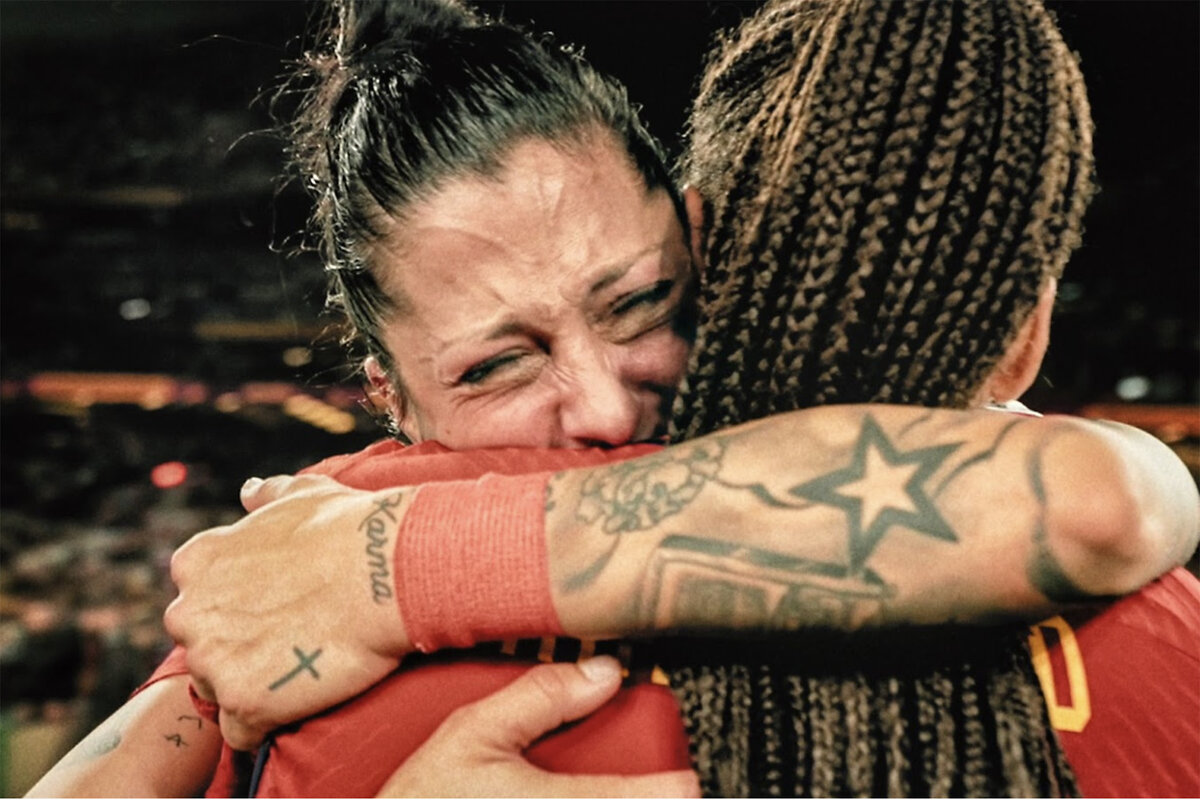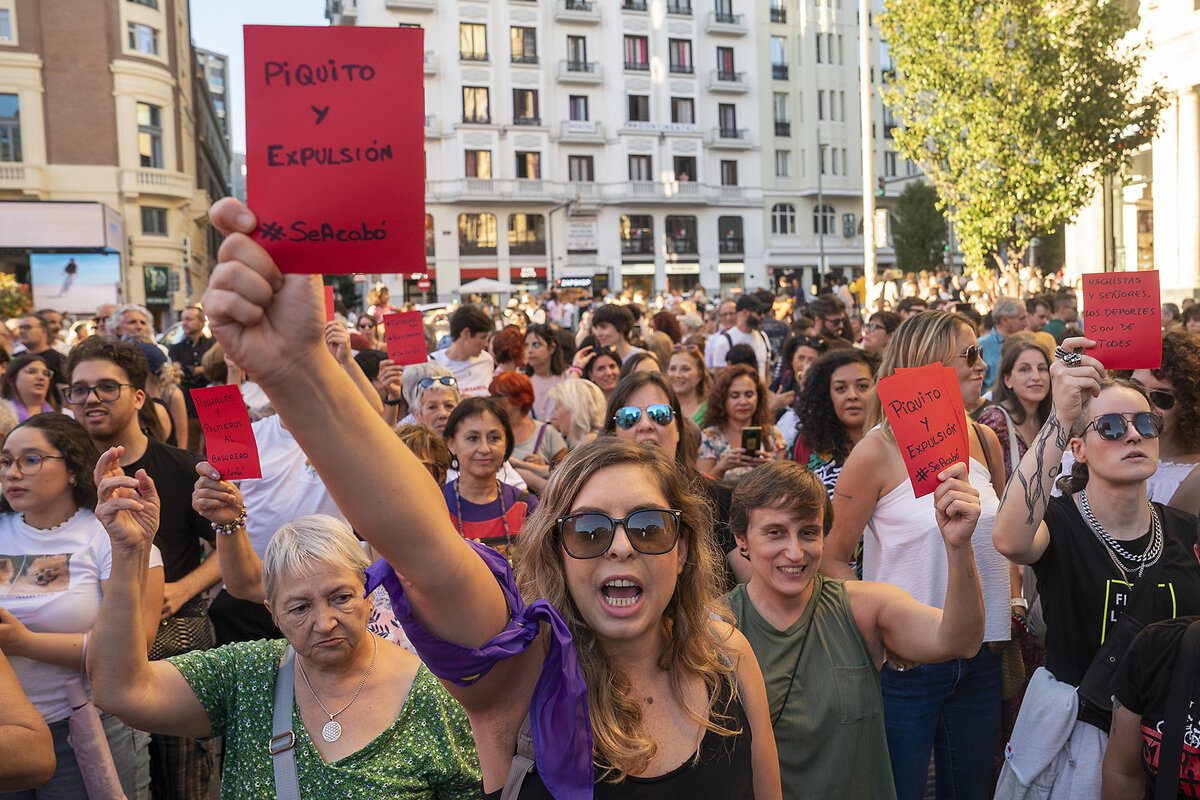An unwanted kiss shook Spanish soccer – and society. A new documentary explores why.
Loading...
| Santa Cruz, Spain
The kiss changed everything.
It was August 2023 and the Spanish women’s soccer team was standing on the awards podium, basking in the glow of their first World Cup win.
As deafening cheers engulfed Accor Stadium in Australia, Luis Rubiales, then-president of the Royal Spanish Football Federation (RFEF), made his way through the line of players to offer his congratulations. When he got to forward Jenni Hermoso, he grabbed her by the back of the head and forcibly kissed her on the lips.
Why We Wrote This
Just as the Spanish women’s national team was celebrating its 2023 World Cup victory, it found itself embroiled in a fight with the soccer federation president over an unwanted kiss. Netflix has just released a documentary looking at the scandal.
Little did Ms. Hermoso or the rest of the team know that over the next days and weeks, that kiss would not only threaten to mar their historic win but would spark Spain’s version of the #MeToo movement. Athletes, politicians, and celebrities came forward in support, shouting “se acabó” – it’s all over – and forced a national dialogue about sexism, machismo, and sexual abuse in Spanish football and broader society.
Now, a new Netflix documentary, out Nov. 1, looks to tap into the culture of Spanish women’s football that led up to the kiss, and everything that came after it. “It’s All Over: The Kiss That Changed Spanish Football” is a story not just of players’ tenacity and passion to overcome the challenges that followed the infamous kiss, but their daily fight for equality and recognition in a male-dominated sport.
“It’s All Over,” directed by Joanna Pardos, is a testament to the Spanish team’s resilience and its ability to rise up against adversity. And while viewers will certainly come away with a sense of euphoria about the success of this past year’s #SeAcabó social movement, women’s soccer continues to face setbacks and roadblocks to real change.
“We can’t deny that we’re in a process of social change, thanks to years of hard work and sacrifice by our female athletes,” says Susana Vazquez Cupeiro, a professor of gender studies at the Universidad Complutense de Madrid. “[But] macho violence still affects female athletes in both explicit and more subtle forms. ... A greater collective effort is necessary if we want to achieve equality.”
“We’d started a war”
Millions of people around the world saw Mr. Rubiales kiss Ms. Hermoso on the mouth. But the troubles for the Spanish team had begun brewing months before. So while “It’s All Over” begins focused on the fallout of the kiss, it makes an important flashback to when the real shift within the system began.
In September 2022, 15 players from the national team declared themselves unavailable for selection after their demands to oust coach Jorge Vilda went unanswered by the Spanish football federation. Though the players’ specific complaints about Mr. Vilda were not made public at the time, some later said that he at team hotels.
By the time the World Cup came around less than a year later, eight of the 15 players had decided to come back, but tensions between the national team players and the federation were already high.
“We always seem to be asking for things that aren’t considered ours,” says national team defender Irene Paredes in the documentary.
“We realized we’d started a war,” goalkeeper Lola Gallardo goes on to say. “[The RFEF] was up here, and we were down there.”
There were times when many players felt they couldn’t win that war. Through text messages between players, personal testimonies, and media leaks by the RFEF, the documentary shows how Mr. Rubiales and his cohorts pitted players against one another in order to come out on top.
On Aug. 25, five days after the World Cup, Mr. Rubiales gave an impassioned speech to the football federation’s general assembly, where he hit out at “false feminism” and refused to resign. For the national team, it was too much. Midfielder Alexia Putellas took to the social platform X and published a post that would come to change women’s football: “This is unacceptable. It’s all over.”
National team members jumped on the moment, reposting it on their own social media platforms, and soon the message was being shared by Spanish athletes, celebrities, and even Spanish Prime Minister Pedro SГЎnchez. On Sept. 6, Ms. Hermoso filed a criminal complaint against Mr. Rubiales, and four days later, he resigned as RFEF president.
Small steps forward
Despite the Rubiales affair, Spanish women’s soccer continues to suffer from a lack of systemic change. Part of that stems from laws that some say don’t adequately protect players.
Spain has been a leader in Europe when it comes to legislation on sexual violence. A 2022 law required that women must explicitly give consent for sexual acts. But Mr. Rubiales was able to remain in his position for months after the kiss due to a holdover law from 1990, whose 2022 update has yet to be implemented.
“In Spain, we have lots of laws that show how feminist we are, but nothing is actually being put into practice,” says Mar Mas, the chairwoman of the Madrid-based Association for Women in Professional Sports. “When it comes down to it, the government is on the side of the football federation, so nothing changes. How do I feel? Frustrated.”
“It’s All Over” does suggest, however, that mindsets in Spain are starting to change when it comes to female athletes, if not to sexism more generally.
As the #SeAcabГі movement took off, women across Spain spoke of the micromachismos they experienced in the workplace. And a November 2023 by the Centro Investigaciones SociolГіgicas public research institute found that 96% of men surveyed thought gender equality was the key to a more fair society.
Still, Spanish soccer observers say the changes amount to baby steps. For the second year in a row on Monday, Barcelona midfielder Aitana Bonmatà was awarded the women’s Ballon d’Or, an international award that recognizes the sport’s best players each year. But only a handful of the players shortlisted for the award were present at the presentation ceremony due to it being scheduled at the same time as women’s international matches – a decision that critics say shows a lack of respect for the women’s game.
And when Jenni Hermoso was awarded the SГіcrates humanitarian award at the same ceremony, for her stand against sexual violence and inequality in soccer, the host reportedly to follow the women in a standing ovation.
As the film comes to a close, there is a feeling that, when it comes to achieving equality in women’s football, the job is not over yet. Some members of the national team have spoken out about violence against women in sports at the United Nations, while others have joined sports unions to bring about change for the future. But there is a sense of strength in numbers.
“The fact that people from around the world came together to support me gave me a superpower to keep going,” says Ms. Hermoso in the film. “After everything we’ve been through, we’re still here.”










